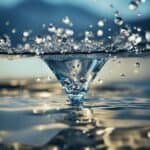Hello! You’ve landed on the right page if you’re one of the curious minds wondering: “Does Dasani water have salt in it?” This is one question that has been a source of contention for quite a while, mostly due to some surprising elements you wouldn’t expect in bottled water. Let’s delve right in and quench our thirst for knowledge.
What Is Dasani Water?
Before we discuss the ingredients in Dasani water, it’s essential to know what Dasani water is. Produced by the Coca-Cola Company, Dasani is a brand of bottled water that hit the shelves back in 1999. You’ll find it in vending machines, supermarkets, and convenience stores around the globe.
- Enhanced with minerals for a crisp, clean and fresh taste.
- Bottle made from 100% recycled material, excluding label and cap.
- Refreshing hydration on the go for all of life’s thirst-worthy moments.
- Purified water using reverse osmosis filtration process
- 24 pack, 16.9 fl oz bottles of Dasani Purified Water
- Dasani water
- 12 fl oz
- Packed and Shipped by west aphrodite
- 24 bottles
- 3×8 packs
- Dasani Bottled Water Dasani Water 24 pack
The Ingredients in Dasani Water
So, let’s get right to the point: Does Dasani water have salt in it? The simple answer is yes.
According to its label, Dasani water contains purified water, magnesium sulfate, potassium chloride, and salt.
To put it in a simpler format:
- Purified Water
- Magnesium Sulfate
- Potassium Chloride
- Salt
Yes, you read that right. Salt is indeed one of the listed ingredients in Dasani water. But it’s important to remember that the salt content is minimal.
Why is There Salt in Dasani Water?
You might be thinking, “Salt in water? Why?” It’s a valid question.
Salt is added to Dasani water for taste. While this might seem counterintuitive, many people find that a pinch of salt makes the water taste fresher. The quantities used are incredibly minute and certainly not enough to contribute to your daily sodium intake significantly.
Is The Salt In Dasani Water Harmful?
So, is the salt in Dasani water harmful?
The answer is a resounding no. The quantity of salt present in Dasani water is insignificant. It’s not enough to cause health issues or contribute meaningfully to your daily sodium intake. So, if you’re watching your salt intake, you don’t have to worry about Dasani water tipping the scales.
What About the Other Ingredients?
You might have noticed the other ingredients mentioned: magnesium sulfate and potassium chloride.
Magnesium sulfate, also known as Epsom salt, is often used in bath salts. It is recognized as safe for consumption in the quantities present in Dasani water. Potassium chloride is a common salt substitute and is also deemed safe for consumption.
To summarise:
- Salt: Enhances taste, safe for consumption
- Magnesium Sulfate: Safe for consumption
- Potassium Chloride: Safe for consumption
Dasani and Reverse Osmosis
An important part of understanding why salt and other minerals are added to Dasani water involves understanding the purification process that Dasani uses – reverse osmosis.
Reverse osmosis is a filtration process that removes many types of large molecules and ions from solutions. The Coca-Cola Company uses this process to purify the water that goes into every Dasani bottle. Here’s how it works:
- Water is pushed through a semi-permeable membrane under pressure.
- Larger molecules (such as contaminants and impurities) are held back.
- Only smaller molecules (like water molecules) can pass through.
This process effectively strips the water of impurities. However, it also removes naturally occurring minerals that contribute to water’s taste.

The Need for Salt and Other Minerals
After the reverse osmosis process, the water ends up being “flat” or “tasteless”. This is because naturally occurring minerals that provide flavor to the water, such as calcium, potassium, and magnesium, are removed during the purification process.
To make up for the loss of these minerals and the resulting lack of taste, Dasani adds small amounts of salt (sodium chloride), magnesium sulfate, and potassium chloride back into the purified water. These minerals enhance the taste, ensuring that the water doesn’t taste ’empty’ to our palates.
The goal here is not to increase sodium levels or to offer a source of these minerals, but simply to improve taste. The quantities used are extremely small and are regulated by food safety guidelines, so they pose no health risks.
In essence, the salt and other minerals in Dasani water are there to make up for the taste that gets lost during the reverse osmosis process. That’s why when you sip a Dasani, you’re experiencing a taste that’s crisp, fresh, and invigorating. It’s a delicate balance, but one that makes Dasani a popular choice for those seeking hydration.
Dasani Compared to Other Brands
When comparing Dasani to other bottled water brands, it’s important to note that the addition of minerals for taste is not unique to Dasani. Brands like Aquafina and SmartWater also use a similar process. The mineral content, taste, and price may vary between brands, but the concept remains the same: to provide a clean, fresh taste to consumers.
For example, while Dasani uses salt, magnesium sulfate, and potassium chloride to enhance taste, SmartWater adds calcium chloride, magnesium chloride, and potassium bicarbonate. Each brand uses these ingredients to create a unique taste profile, but all are safe to consume and provide a similar refreshing experience.
- Enhanced with minerals for a crisp, clean and fresh taste.
- Bottle made from 100% recycled material, excluding label and cap.
- Refreshing hydration on the go for all of life’s thirst-worthy moments.
- Purified water using reverse osmosis filtration process
- 24 pack, 16.9 fl oz bottles of Dasani Purified Water
- Dasani water
- 12 fl oz
- Packed and Shipped by west aphrodite
- 24 bottles
- 3×8 packs
- Dasani Bottled Water Dasani Water 24 pack
The Environmental Impact of Bottled Water
Bottled water has a significant environmental impact. It requires a lot of energy to extract, bottle, and distribute water. Plastic bottles also contribute to environmental pollution, especially if not recycled properly.
It’s estimated that making bottles to meet America’s demand for bottled water uses more than 17 million barrels of oil annually, enough to fuel 1.3 million cars for a year. Additionally, the plastic waste generated from bottles that aren’t recycled properly can harm wildlife and pollute oceans and other ecosystems.
Therefore, while bottled water might offer convenience and a distinct taste, it’s worth considering the environmental implications of regular consumption.

The Health Debate around Bottled Water
Bottled water is often perceived as safer or cleaner than tap water, but this isn’t necessarily the case. In many developed countries, tap water is strictly regulated and safe to drink. Some studies suggest that bottled water is not always better than tap water in terms of safety and quality, and it’s much more expensive.
Concerns have also been raised about chemicals from plastic bottles leaching into the water, especially if bottles are exposed to heat or left for a long time. This is still a topic of ongoing research, but it’s something to consider when choosing between bottled and tap water.
The Science of Taste in Water
Water’s taste is affected by several factors, including temperature, pH, and mineral content. Pure water can taste “flat” because it lacks the minerals and salts that our taste buds respond to. The minerals added to bottled water, like Dasani, provide a fresher taste that many people prefer.
When water is stripped of these minerals during purification processes like reverse osmosis, it can lose its flavor. By adding small amounts of minerals back into the water, companies like Dasani can ensure their product tastes fresh and appealing.
Alternatives to Bottled Water
Considering the environmental impact and the ongoing debates about health, you might be wondering about alternatives to bottled water.
One option is to invest in a home water filtration system. This allows you to enjoy purified water straight from your tap without the need for plastic bottles. It’s also generally more cost-effective in the long run.
Another alternative is using refillable water bottles. Many public places now have water fountains or refill stations where you can fill your bottle. This is a great way to stay hydrated on the go without contributing to plastic waste.
Both alternatives can offer the convenience and taste of bottled water, without the environmental impact. Plus, you might find that you save money in the process.
Conclusion
So there you have it. Does Dasani water have salt in it? Yes, it does. But, it’s nothing to worry about. The salt, along with magnesium sulfate and potassium chloride, are there to enhance the water’s taste. Their quantities are too minuscule to pose health risks or impact your daily salt intake significantly. So, next time you reach for a bottle of Dasani, remember, you’re simply enjoying a subtly flavored, refreshing drink. Cheers to staying hydrated!
Frequently Asked Questions
1. Does Dasani water have salt in it (or, Does Dasani have salt)?
Yes, Dasani water does contain a small amount of salt. The salt, along with magnesium sulfate and potassium chloride, is added to enhance the taste of the water.
2. Why is salt added to Dasani water (or, Why does Dasani have salt)?
Salt is added to Dasani water to improve its taste. The purification process that Dasani water undergoes—reverse osmosis—strips the water of natural minerals that contribute to its taste. Adding a small amount of salt and other minerals helps to restore some of this taste.
3. Is the salt in Dasani water harmful?
No, the salt in Dasani water is not harmful. The amount of salt is very minimal and does not contribute significantly to your daily sodium intake.
4. What are the other ingredients in Dasani water?
In addition to salt, Dasani water also contains magnesium sulfate and potassium chloride. These ingredients are added to improve the taste of the water and are safe for consumption.
5. How does Dasani water compare to other bottled water brands?
Many bottled water brands, like Aquafina and SmartWater, also add minerals to their water to enhance the taste. The specific minerals and the amount added may vary, but all are safe for consumption.
6. What is the environmental impact of bottled water?
Bottled water production has a significant environmental impact. It requires a lot of energy to extract, bottle, and distribute the water. Additionally, plastic bottles can contribute to environmental pollution if not properly recycled.
7. Are there alternatives to bottled water?
Yes, there are several alternatives to bottled water. One is using a home water filtration system, which can provide purified tap water. Another is using refillable water bottles, which can be filled at water fountains or refill stations and help reduce plastic waste.
8. Is bottled water healthier than tap water?
The healthiness of bottled water compared to tap water can depend on several factors, including the quality of the local tap water and the type of bottled water. In many developed countries, tap water is strictly regulated and safe to drink. Some studies suggest that bottled water is not always superior to tap water in terms of safety and quality.
9. How much salt is in Dasani Water?
Dasani water, a brand of bottled water produced by The Coca-Cola Company, does contain some amount of salt (sodium) to enhance the taste. The amount of salt can vary slightly depending on the specific product and where it’s sold, but typically, Dasani water contains a low level of added sodium for taste.
Dasani’s typical sodium content was listed as about 2% of the Daily Value for sodium per serving, based on a 2,000 calorie diet. This translates to around 50 milligrams of sodium per 1 liter (about 34 milligrams of sodium per 8 ounces of water). However, these numbers can change, and it’s always best to check the most current nutritional information on the product label or contact the manufacturer for the most up-to-date information.












